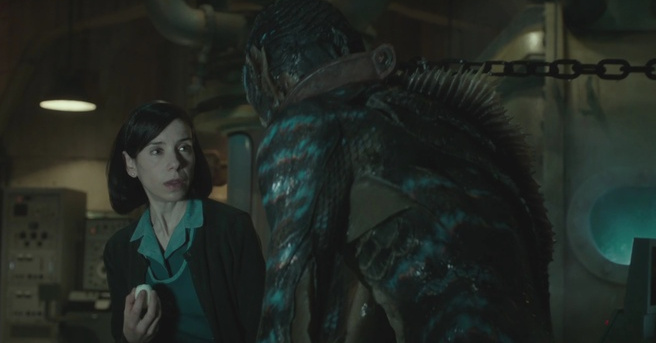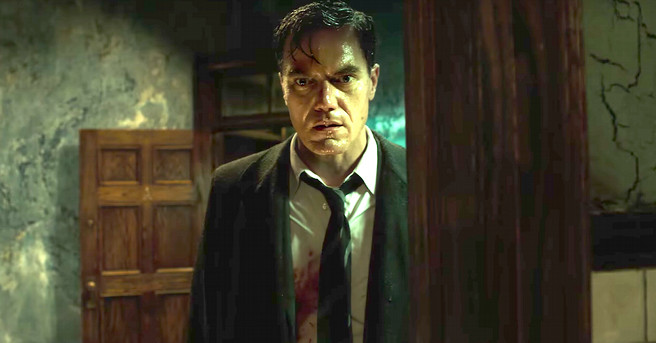PLOT: In 1962 Baltimore, a mute cleaning woman makes an unusual acquaintance at the secret lab where she works: a half-man, half-fish creature stolen from the Amazon jungle.
REVIEW: One of the great things about Guillermo del Toro is, you can point to almost every one of his movies and say, “That’s a quintessential Guillermo del Toro movie.” From the fun-loving comic book antics of the HELLBOY films, to the somber, bittersweet fantasy of PAN’S LABYRINTH, each one of del Toro’s movies wears the stamp of his exceptional vision. Hell, even MIMIC – arguably the most impersonal of his films – still proudly displays plenty of the hallmarks we’ve come to associate with the filmmaker. All this to say, del Toro has done an incredible job over the past 20 years of making himself one of the most idiosyncratic artists working in cinema; he’s absolutely wears his heart on his sleeve, unafraid to put it out all there for the world to see.
And THE SHAPE OF WATER may be the ultimate Guillermo del Toro movie. The tenderness of its outsider characters, the beauty seen in the unusual, the melding of the fantastical with the realistic, the threat felt from unsympathetic conformists. Not to mention the fact it’s a love story between a mute woman and a half-man/half-fish being… THE SHAPE OF WATER is a touching fairytale for adults, brimming with imaginative detail and touting superb efforts on the parts of every department, from the meticulous production design to the handsome cinematography to the thoroughly convincing make-up on the striking creature at the center of the story. It is also refreshingly frank about human nature, unafraid to allow its characters (human and inhuman) to be sexual, flawed and vulnerable. It could very well be del Toro’s most complex screenplay.

I haven’t even gotten to the performances; this film features three brilliant ones. Sally Hawkins is unforgettable as Elisa, a mute cleaning woman in a secret government lab who makes an unexpected connection to the newest resident of the base: an amphibian man captured in the Amazon and brought back for callous experimentation by the military. Hawkins is nothing short of transcendent in the role, giving an instant-classic of a performance, all the while saying not a single word of dialogue. The military is personified in all its cold, calculating glory by Strickland, portrayed by Michael Shannon, who has never been more irresistibly unsettling (and that’s saying something!). The third great performance comes from character actor extraordinaire Richard Jenkins, who plays Elisa’s kindhearted gay neighbor Giles, who has his own compelling story. The rest of the cast – including Michael Stuhlbarg and Octavia Spencer – is very good, but the aforementioned trio are never less than captivating. (I would be remiss not to mention the amphibian man played by del Toro’s frequent collaborator Doug Jones, who once again can’t be seen underneath a ton of make-up but certainly makes his mark with a very specific physical performance that speaks volumes.)
As is his wont, del Toro has set the film in the past; 1962, the height of the Cold War and a time when America was at peak wholesome family values. Surely not the best time to be a mute janitor or an aqua-man. In his most exemplary films (THE DEVIL’S BACKBONE and PAN’S LABYRINTH, for my money), del Toro very specifically uses the time period as an ominous backdrop for his bizarre fables, and here it feels incredibly poignant that our unusual love story is set during this chaste time. Just as important – not to mention timely – is the subplot revolving around the Michael Shannon character. A growling alpha male with a God complex, Strickland wields his power like a weapon, intimidating subordinates and casually implying some very inappropriate things to Elisa. Talk about ripped from the headlines. Social relevancy aside, the character is a love-to-hate creep played perfectly by Shannon, up there with del Toro’s most loathsome villains.

The film stumbles a bit here and there. Perhaps a little too much time is spent on a subplot involving a Russian spy who has infiltrated the secret lab, disrupting the otherwise effortless flow of the film. And, to be perfectly honest, I could have used more footage of the creature during the first half; del Toro’s screenplay juggles so many tangents early on that I often felt myself yearning just to actually look at the amphibian man instead of various people in his orbit. There are also a handful of touches that are a bit heavy-handed, like a brief musical sequence that is inherently sweet but a little too cutesy for its own good. I can’t be very angry at these minor slips; in true del Toro style, even the imperfections can and should be embraced. As mentioned before, del Toro wears his heart on his sleeve, and I applaud his willingness to take all sorts of weird chances even if they don’t always hit the bullseye.
I’ll admit it, I thought del Toro had stumbled a bit with his last two films. PACIFIC RIM, for me, has a good idea but is sunk by uninteresting characters and gloomy action sequences, and while CRIMSON PEAK looks gorgeous, I find it has something of a hollow core; I’m unable to invest emotionally in it. Del Toro already has an impressive enough a track record that I wasn’t concerned, but it can be a tad worrisome when a great director puts out two lesser efforts in a row. All of my disquiet was for naught, as his latest finds del Toro firmly back in territory he excels at, telling a beautiful story of unconventional love and unorthodox creatures. I’ve used a lot of adjectives in this review, but beautiful is really the very best word to describe THE SHAPE OF WATER.




















Follow the JOBLO MOVIE NETWORK
Follow us on YOUTUBE
Follow ARROW IN THE HEAD
Follow AITH on YOUTUBE